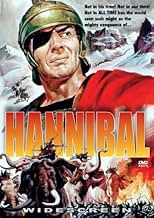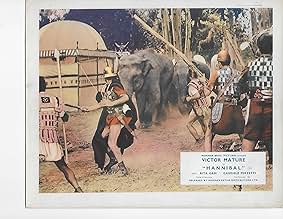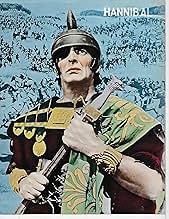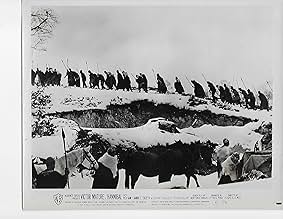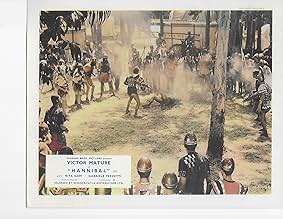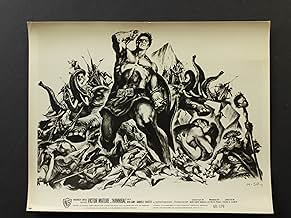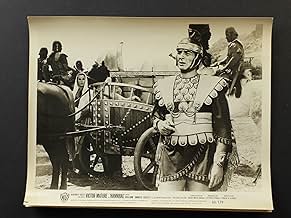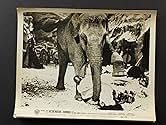IMDb-BEWERTUNG
5,2/10
1213
IHRE BEWERTUNG
Während des Zweiten Punischen Krieges im Jahr 218 v. Chr. greift der karthagische General Hannibal die Römische Republik an, indem er mit seinem riesigen Heer die Pyrenäen und die Alpen über... Alles lesenWährend des Zweiten Punischen Krieges im Jahr 218 v. Chr. greift der karthagische General Hannibal die Römische Republik an, indem er mit seinem riesigen Heer die Pyrenäen und die Alpen überquert.Während des Zweiten Punischen Krieges im Jahr 218 v. Chr. greift der karthagische General Hannibal die Römische Republik an, indem er mit seinem riesigen Heer die Pyrenäen und die Alpen überquert.
Terence Hill
- Quintilio
- (as Mario Girotti)
Renzo Cesana
- Minucio
- (as Renato Cesana)
Bud Spencer
- Rutario
- (as Carlo Pedersoli)
Empfohlene Bewertungen
"Hannibal" is a great movie for nine year-old boys, or at least it was back in 1960 when I sat through it twice at a Saturday matinée. I don't think it had much of a mainstream release, playing mostly to kiddie matinée and drive-in audiences. The film planted in me an interest in this historical period and was my first taste of cinema gore; my one memory being the blood pouring from a soldier's mouth after he was crushed by an elephant during the army's march over the alps.
In style "Hannibal" is like a really bad spaghetti western, only set it 200BC and produced by people generally clueless about just who was their target audience. On one hand the less your sophistication the less energy you will need to burn suspending disbelief. On the other hand the subject matter cries out for a more sophisticated audience interested in history. And finally the awkwardly inserted love story will go unappreciated by both sophisticated and unsophisticated viewers.
Hannibal was a brilliant military tactician from Carthage (now Tunisa) who gave Rome a run for its money as the dominant power two centuries before the birth of Christ. The film was promoted by Warner Brothers as "a fanciful adaptation of history" (make that an extremely condensed adaptation). Given all the omissions it is difficult to understand why they felt compelled to invent a love story. It might have made some sense if they had paid a box office draw actress to star as the title character's love interest; but Rita Gam was an aging bit player, pleasant in a wholesome Dorothy McGuire way but too detuned to add any sizzle to a production desperately in need of some sparks.
After an especially ponderous title sequence a narrator begins the film by getting the audience up to speed on current events (circa 200 BC). Rome is threatening Carthage and Hannibal has decided to head things off by moving his army from Spain to Northern Italy via the Alps. Then we get 15 minutes of the 40,000-man Carthaginian army making its way single file over the icy slopes. The editor cuts it shots of officers shouting, "keep moving," soldiers slipping off the path to an icy death, and the same group of elephants rounding the same fake soundstage boulder. At several points the men must pull themselves up a steep incline with a rope. There are no shots of the elephants, horses, or wagons climbing this rope and this becomes the first of many suspension of disbelief moments; it is unwise to dwell on why the soldiers are subjecting themselves to this dangerous climb since there must be a nearby Roman road for all the animals and baggage.
Hannibal's army emerges from the icy mountain and camps near the country villa of Roman Senator Fabius (Gabriele Ferzetti - despite the name this is not a girl). Fabius is in Rome futilely suggesting that they employ guerrilla warfare and avoid direct confrontation with Hannibal's army. This was in fact the way that the Romans were finally able to rid themselves of the invader but it took them several years to adopt such tactics.
Fabius' son Quintilius (Terence Hill who I've always confused with Terrance Stamp) and niece Sylvia (Rita Gam) are at the villa and Hannibal captures them. Hannibal and Sylvia have a romance and she is released to tell Rome what a big army he has and that he has only crossed the Alps because he wants peace (could have fooled me). Before you know it Hannibal has hurt his eye and Victor Mature spends the rest to the story wearing an eye patch and the Roman Senate spends its deliberations telling pirate jokes.
The elephants get inserted into several poorly edited battle sequences. They lumber around (on occasion they speed up the film to make it look like they are charging) and crush a lot of Romans off-camera and the sound people make noises that make it seem like the straw being thrown toward the elephants are actually arrows.
Then at about the one third point of the actual story they run out of film, the narrator briefly explains that Hannibal never was able to sack Rome, and the ponderous title sequence runs again but this time it is full of credits.
Mature was a horrible actor nearing the end of his career at this point. Since most of the cast are Italians whose lines were dubbed and there is no indication that anyone received acting for the camera direction, the production manages a nice lethargic unity.
Then again, what do I know? I'm only a child.
In style "Hannibal" is like a really bad spaghetti western, only set it 200BC and produced by people generally clueless about just who was their target audience. On one hand the less your sophistication the less energy you will need to burn suspending disbelief. On the other hand the subject matter cries out for a more sophisticated audience interested in history. And finally the awkwardly inserted love story will go unappreciated by both sophisticated and unsophisticated viewers.
Hannibal was a brilliant military tactician from Carthage (now Tunisa) who gave Rome a run for its money as the dominant power two centuries before the birth of Christ. The film was promoted by Warner Brothers as "a fanciful adaptation of history" (make that an extremely condensed adaptation). Given all the omissions it is difficult to understand why they felt compelled to invent a love story. It might have made some sense if they had paid a box office draw actress to star as the title character's love interest; but Rita Gam was an aging bit player, pleasant in a wholesome Dorothy McGuire way but too detuned to add any sizzle to a production desperately in need of some sparks.
After an especially ponderous title sequence a narrator begins the film by getting the audience up to speed on current events (circa 200 BC). Rome is threatening Carthage and Hannibal has decided to head things off by moving his army from Spain to Northern Italy via the Alps. Then we get 15 minutes of the 40,000-man Carthaginian army making its way single file over the icy slopes. The editor cuts it shots of officers shouting, "keep moving," soldiers slipping off the path to an icy death, and the same group of elephants rounding the same fake soundstage boulder. At several points the men must pull themselves up a steep incline with a rope. There are no shots of the elephants, horses, or wagons climbing this rope and this becomes the first of many suspension of disbelief moments; it is unwise to dwell on why the soldiers are subjecting themselves to this dangerous climb since there must be a nearby Roman road for all the animals and baggage.
Hannibal's army emerges from the icy mountain and camps near the country villa of Roman Senator Fabius (Gabriele Ferzetti - despite the name this is not a girl). Fabius is in Rome futilely suggesting that they employ guerrilla warfare and avoid direct confrontation with Hannibal's army. This was in fact the way that the Romans were finally able to rid themselves of the invader but it took them several years to adopt such tactics.
Fabius' son Quintilius (Terence Hill who I've always confused with Terrance Stamp) and niece Sylvia (Rita Gam) are at the villa and Hannibal captures them. Hannibal and Sylvia have a romance and she is released to tell Rome what a big army he has and that he has only crossed the Alps because he wants peace (could have fooled me). Before you know it Hannibal has hurt his eye and Victor Mature spends the rest to the story wearing an eye patch and the Roman Senate spends its deliberations telling pirate jokes.
The elephants get inserted into several poorly edited battle sequences. They lumber around (on occasion they speed up the film to make it look like they are charging) and crush a lot of Romans off-camera and the sound people make noises that make it seem like the straw being thrown toward the elephants are actually arrows.
Then at about the one third point of the actual story they run out of film, the narrator briefly explains that Hannibal never was able to sack Rome, and the ponderous title sequence runs again but this time it is full of credits.
Mature was a horrible actor nearing the end of his career at this point. Since most of the cast are Italians whose lines were dubbed and there is no indication that anyone received acting for the camera direction, the production manages a nice lethargic unity.
Then again, what do I know? I'm only a child.
The print that I viewed was the one available from "Belle and Blade Video". The print quality is not great but watchable. This one really needs to be seen in the widescreen format as this Pan and Scan version has many scenes where actors are speaking and are not even in frame. I can only guess how this would effect some of the many battle scenes. The problem with this movie is not so much in the screenplay, with all the elements we have come to expect in the Italian Sword and Sandal movies. The obligatory "love story" and the not too historical depiction of Ancient Combat. Trying to tell the complete story of the Great Carthaginian leader who kept Rome in Terror for nearly a decade is not an easy one. The direction and editing is what I think is the real problem here. Some scenes are just too long while others cry out for more attention. There is a disturbing quality to some of the battle scenes, which switch from outdoor photography to sound stage. Since it is the only movie out there on Hannibal, it wins by default. I am amazed that this story has not been redone. Overall, if you are into Ancients and the Sword and Sandal Genre you probably will like this film. Oh, by the way the obligatory "Elephants" are there, and handled as well as one might expect from this type of film.
I don't know who the hell shot this, but I suppose I could glance at the credits and lay blame on the culprits, but since I'm lazy and irritated right now I'll just skip the formality and say that Victor Mature probably fired his agent several times over after being booked for this gig.
He is quite literally the only competent person thesping his role, all the while other actors are stiff, comical, and otherwise just plain unconvincing. But like I implied in my first paragraph, it's not even the acting (however bad by the supporting cast) that's the issue: It's the cinematography: It's the direction and shot set ups: It's poor scheduling of the extras so the most can be gotten out of them shot wise. It's everything from the awful costumes to the lack of historical accuracy, to the extreme lack of consistent production values.
The battle scenes are so poorly staged that you wonder who the hell was in charge of this thing. The acting, as mentioned, by all other than the lead (Mature) is some of the worst I've seen for a feature film. It's that bad.
Avoid this thing.
He is quite literally the only competent person thesping his role, all the while other actors are stiff, comical, and otherwise just plain unconvincing. But like I implied in my first paragraph, it's not even the acting (however bad by the supporting cast) that's the issue: It's the cinematography: It's the direction and shot set ups: It's poor scheduling of the extras so the most can be gotten out of them shot wise. It's everything from the awful costumes to the lack of historical accuracy, to the extreme lack of consistent production values.
The battle scenes are so poorly staged that you wonder who the hell was in charge of this thing. The acting, as mentioned, by all other than the lead (Mature) is some of the worst I've seen for a feature film. It's that bad.
Avoid this thing.
This is one of several epic Italian productions 'supervised' by Hollywood directors - others of its ilk include THE GIANT OF MARATHON (Jacques Tourneur, 1959), Joseph AND HIS BRETHREN (Irving Rapper, 1960), THE MONGOLS (Andre' De Toth, 1961), THE THIEF OF BAGDAD (Arthur Lubin, 1961), THE WONDERS OF ALADDIN (Henry Levin, 1961) and SODOM AND GOMORRAH (Robert Aldrich, 1962); Ulmer himself served again in the same capacity on L' ATLANTIDE (1961).
As was generally the case, in spite of the participation of such noted film-makers, these spectacles displayed little directorial flair; in fact, this particular example is only distinguished from similar sword-and-sandal efforts by its above-average cast - though, to be fair, Ulmer stated in the accompanying interview on the VCI DVD that he didn't have final say on the film and, consequently, his vision was compromised by financiers who found his approach "too philosophical"! In any case, while the "elephant walk" (Hannibal famously crossed the Alps on pachyderms) and battle sequences are well enough staged, the look of the film is rather shoddy and bears evidence of budgetary restrictions. By the way, the Italian side of the directorial chores were handled by Carlo Ludovico Bragaglia - a veteran of costume pictures who would soon replace Vittorio Cottafavi on AMAZONS OF ROME (1961), after the latter fell out with leading man Louis Jourdan!
Victor Mature, himself a regular of this type of film, is ideally cast as the legendary Carthaginian warrior - though his performance is merely adequate, the script having made his character distinctly one-dimensional (where he's involved in an unconvincing and dreary romance with Rita Gam, a woman from the enemy ranks); Gabriele Ferzetti lends dignity to the proceedings as a Roman senator. A surprising presence here is that of Spaghetti Western/action-comedy icon Terence Hill (billed under his real name of Mario Girotti) - playing the key role of Ferzetti's son; according to the IMDb, his subsequent frequent on-screen partner Bud Spencer also appears in the film...but I didn't spot him!
The supplements on the VCI disc include a precious 33-minute audio interview with Ulmer (conducted by Peter Bogdanovich), which imparts several interesting bits on the production of F.W. Murnau's THE LAST LAUGH (1924) - on which Ulmer served as art director - and HANNIBAL itself; also, besides having the director enthusiastically discuss John Schlesinger's MIDNIGHT COWBOY (1969), it reveals his dislike of fellow expatriates Otto Preminger and William Dieterle!
As was generally the case, in spite of the participation of such noted film-makers, these spectacles displayed little directorial flair; in fact, this particular example is only distinguished from similar sword-and-sandal efforts by its above-average cast - though, to be fair, Ulmer stated in the accompanying interview on the VCI DVD that he didn't have final say on the film and, consequently, his vision was compromised by financiers who found his approach "too philosophical"! In any case, while the "elephant walk" (Hannibal famously crossed the Alps on pachyderms) and battle sequences are well enough staged, the look of the film is rather shoddy and bears evidence of budgetary restrictions. By the way, the Italian side of the directorial chores were handled by Carlo Ludovico Bragaglia - a veteran of costume pictures who would soon replace Vittorio Cottafavi on AMAZONS OF ROME (1961), after the latter fell out with leading man Louis Jourdan!
Victor Mature, himself a regular of this type of film, is ideally cast as the legendary Carthaginian warrior - though his performance is merely adequate, the script having made his character distinctly one-dimensional (where he's involved in an unconvincing and dreary romance with Rita Gam, a woman from the enemy ranks); Gabriele Ferzetti lends dignity to the proceedings as a Roman senator. A surprising presence here is that of Spaghetti Western/action-comedy icon Terence Hill (billed under his real name of Mario Girotti) - playing the key role of Ferzetti's son; according to the IMDb, his subsequent frequent on-screen partner Bud Spencer also appears in the film...but I didn't spot him!
The supplements on the VCI disc include a precious 33-minute audio interview with Ulmer (conducted by Peter Bogdanovich), which imparts several interesting bits on the production of F.W. Murnau's THE LAST LAUGH (1924) - on which Ulmer served as art director - and HANNIBAL itself; also, besides having the director enthusiastically discuss John Schlesinger's MIDNIGHT COWBOY (1969), it reveals his dislike of fellow expatriates Otto Preminger and William Dieterle!
I like Victor MATURE and would even go as far as to call myself a "fan" of this Arnold Schwarzenegger-predecessor/archetype (with Austrian roots actually), but even I have to admit, that this flick ain't any of his better ones, unfortunately (sigh).
It's awkward from beginning to end: The first scene takes place in the Roman Senate, then you have a long one with the elephants crossing the Alps (that's probably the best of the whole picture, actually you can now turn off your TV-set) and now we're already well over 5 minutes into the picture, still no Hannibal/Annibale. Suddenly one sees some elephants getting loose and a guy which we can identify on second look as Victor Mature does some awkward gestures to get the elephants away. Pretty strange entry for "the hero". Only in scene number 4 and well 10 minutes into the movie someone takes the chance to identify our hero and calls him with his name. OK, the introduction of "the hero" has been managed, somehow.
The ending is equally abrupt, we see Hannibal's army moving along and get a voice over. Obvioulsly the directors (Edgar G. Ulmer usually does it better, but I assume he didn't have much to say in this one) had decided that enough celluloid had been "wasted" and called it a day.
The dialog is so unsophisticated, it hurts, but still not unintentionally funny, only hammy and boring, witless.
Everything in this picture is unfortunately mediocre to sub-par: ahead and foremost the script, but also acting (Victor is certainly also already too old for the role, sorry), photography, whatever. Only the music by Carlo RUSTICHELLI is slightly better, of course he's no Miklos ROSZA either, but at least the music is fitting and powerful. But that does not justify sitting through the whole picture (enjoy the main theme and quit).
For Terence HILL Fans it is worth mentioning that Mario GIROTTI, later known as TH, has a medium large part here and you can watch him "acting" (woodenly, but so what) a Roman.
So my rating is: If you are a Victor Mature fan: 4 out of 10, if you are a Terence Hill fan: 3 out of 10, if you're neither nor: 2 out of 10, so better stay away.
I wish I could have written a better review. :-(
It's awkward from beginning to end: The first scene takes place in the Roman Senate, then you have a long one with the elephants crossing the Alps (that's probably the best of the whole picture, actually you can now turn off your TV-set) and now we're already well over 5 minutes into the picture, still no Hannibal/Annibale. Suddenly one sees some elephants getting loose and a guy which we can identify on second look as Victor Mature does some awkward gestures to get the elephants away. Pretty strange entry for "the hero". Only in scene number 4 and well 10 minutes into the movie someone takes the chance to identify our hero and calls him with his name. OK, the introduction of "the hero" has been managed, somehow.
The ending is equally abrupt, we see Hannibal's army moving along and get a voice over. Obvioulsly the directors (Edgar G. Ulmer usually does it better, but I assume he didn't have much to say in this one) had decided that enough celluloid had been "wasted" and called it a day.
The dialog is so unsophisticated, it hurts, but still not unintentionally funny, only hammy and boring, witless.
Everything in this picture is unfortunately mediocre to sub-par: ahead and foremost the script, but also acting (Victor is certainly also already too old for the role, sorry), photography, whatever. Only the music by Carlo RUSTICHELLI is slightly better, of course he's no Miklos ROSZA either, but at least the music is fitting and powerful. But that does not justify sitting through the whole picture (enjoy the main theme and quit).
For Terence HILL Fans it is worth mentioning that Mario GIROTTI, later known as TH, has a medium large part here and you can watch him "acting" (woodenly, but so what) a Roman.
So my rating is: If you are a Victor Mature fan: 4 out of 10, if you are a Terence Hill fan: 3 out of 10, if you're neither nor: 2 out of 10, so better stay away.
I wish I could have written a better review. :-(
Wusstest du schon
- WissenswertesThe first film to co-star Terence Hill and Bud Spencer, and the only one where they are not the stars of the film. In fact they share no scenes and didn't actually meet until 8 years later.
- PatzerTowards the start of the film there is a panoramic shot of Rome. This shot includes many familiar buildings such as the Colosseum, which was not built until some 300 years after the events of the film.
- Alternative VersionenThere were two different cuts of this movie in existence at the time of release. The version released originally in Italy and subsequently in Germany and maybe other non English speaking European countries had a running time of 95 minutes. The US release version is given with 103 minutes. The BBFC lists a submitted running time of 104m 40s.
- VerbindungenEdited into Ibiza: The Silent Movie (2019)
Top-Auswahl
Melde dich zum Bewerten an und greife auf die Watchlist für personalisierte Empfehlungen zu.
Details
Box Office
- Budget
- 4.000.000 $ (geschätzt)
- Laufzeit1 Stunde 40 Minuten
- Seitenverhältnis
- 2.35 : 1
Zu dieser Seite beitragen
Bearbeitung vorschlagen oder fehlenden Inhalt hinzufügen



